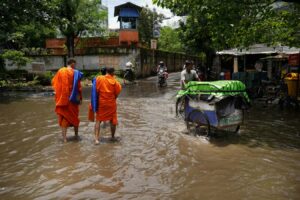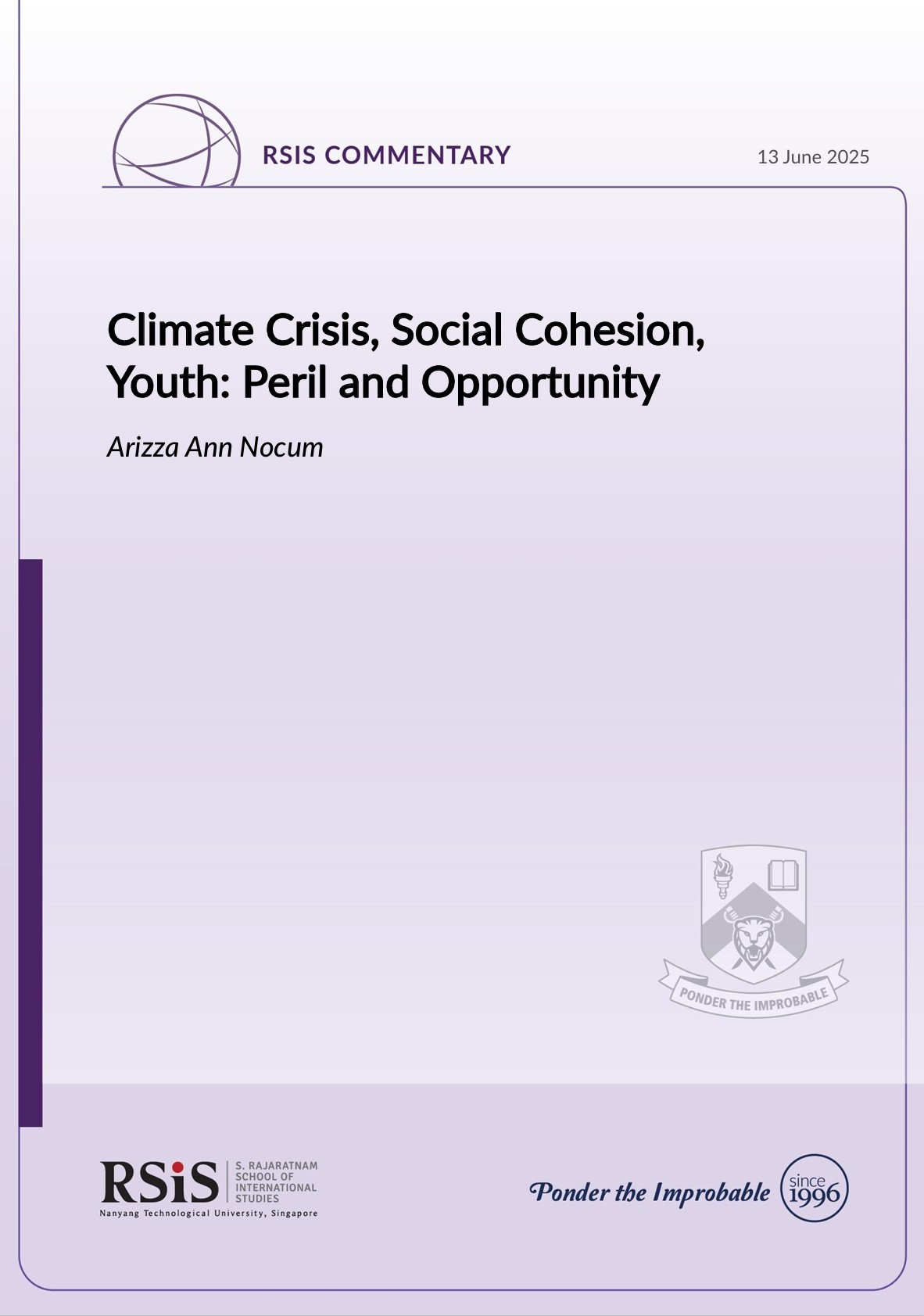13 June 2025
- RSIS
- Publication
- RSIS Publications
- Climate Crisis, Social Cohesion, Youth: Peril and Opportunity
SYNOPSIS
Social cohesion in Southeast Asian nations is threatened by climate change and the numerous natural disasters occurring in the region. More youth-led initiatives to manage such threats are therefore important and they require timely policy support and collaborative partnerships from official agencies.

COMMENTARY
Southeast Asia offers immense economic and cultural opportunities. With a young workforce, a rapidly developing middle class, and a strategic location between the Indian and Pacific Oceans, the region is poised to become the fourth-largest economic region in the world by 2040. Notwithstanding this potential, the climate crisis is tempering optimism, and social cohesion is expected to take a hit.
Rising sea levels and extreme and erratic weather will impact food security, infrastructure, and economic development, threatening harmony and exacerbating inequality, especially between the rural and urban regions.
Communities, however, are not powerless against the impending climate catastrophe.
Social cohesion can be the solution to the climate crisis. Young people, in particular, can be the catalyst and driver for collective climate action.
The Climate Crisis
Located in the world’s most active basin for tropical cyclones, Southeast Asian countries fall within “Typhoon Alley”, with the Philippines receiving the highest number in the region and amongst the highest globally. From 1987 to 2016, the region lost an estimated US$32 billion due to the economic impact of these typhoons, which affected everything from infrastructure and agriculture to tourism.
These impacts are exacerbated by climate change, and many in Southeast Asia are victims of floods, heat waves, and landslides caused by heavy rainfall. Because of this, 60 per cent of residents in the region see a climate future under crisis and believe their lives will be significantly affected by climate change.
Across the region in 2024, Southeast Asians experienced record-high heat indices reaching up to 52 degrees Celsius. Apart from heat-induced sickness, locals faced water shortages and damage to crops. Typhoon Yagi, the biggest typhoon to hit Asia in 2024, affected the Philippines, Vietnam, Laos, Thailand, and Myanmar. As the strongest storm to strike Vietnam in 70 years, Yagi claimed 300 lives in the country and hundreds more elsewhere in the region. In November 2024 alone, the Philippines was hit by six consecutive storm systems during a typhoon season seen to be exacerbated by climate change.
Social Cohesion in Peril
The negative impacts of climate change and natural disasters can also accelerate divisions and weaken social cohesion, compounded by ongoing threats of terrorism, violence, and polarisation across religious and political differences in different parts of Southeast Asia.
Importantly, these impacts can happen at both national and transnational levels in the region. Competition over food, water, and marine resources; the forced displacement of vulnerable groups; and threats to livelihoods that can affect trade have cross-border impacts that can hamper regional efforts at cooperation and adaptation.
Young People’s Perspectives
In a youth-led study conducted by the Kofi Annan Foundation, adverse environmental changes like rising temperatures, frequent droughts, and limited resources have worsened existing conflicts, significantly impacting young Muslims in the Philippines’ Bangsamoro Autonomous Region in Mindanao (BARMM).
In one case study, informants from marginalised communities reported disruptions to education, livelihood, and even safety. One respondent shared: “The droughts have not only destroyed our crops but have also increased tensions in our community. We argue more frequently over access to water, and this sometimes leads to violent disputes.”
Due to the concurrent impacts of conflict and climate-related disasters, families in BARMM are displaced multiple times. “Every time we evacuate, we lose more of our belongings, and it feels like we are starting over again each time. The uncertainty and fear are overwhelming, especially for the younger generation,” shares a respondent from the study.
Yet even with significant hurdles, young people in BARMM are actively involved in local initiatives to combat climate and environmental challenges. However, their efforts are often hampered by insufficient resources and a lack of institutional backing.
Youth-Led Cohesion as a Climate Solution
While social cohesion is under threat, it also plays a crucial role today. Collective action allows individuals and communities to share resources and information more effectively and to establish timely response mechanisms to address the climate crisis. These actions, however, must engage all sectors meaningfully. In Southeast Asia, this often means mobilising people based on their religious identities to undertake environmental action.
In particular, the young people here offer an invaluable resource for partnership as they are digitally savvy, have a great capacity for creative solutions, are receptive to new ideas, and are poised as the next generation of leaders.
While deeper insights into the complex interplay of conflict, climate change, and natural disasters are crucial, strengthening institutional abilities to empower youth-led projects promoting cohesion is vital. This will ensure they have the tools to address the region’s unique challenges and contribute to lasting development.
Policymakers need to continuously examine and tackle the specific difficulties youths face and the wider effects on gender equality and educational disruptions that go beyond immediate consequences like displacement or food shortages.
Overall, young people could be empowered as innovators and leaders in addressing the interconnected issues of conflict and climate change through collaborative partnerships where institutions work alongside youths as co-creators and implementers of solutions, not just as recipients or sources of information.
About the Author
Arizza Ann Nocum is the Co-founder and President of KRIS for Peace, a non-profit organisation promoting peace and development in the Philippines through education and youth leadership. In 2024, KRIS and its partners from Singapore and Europe launched Champions for Peace, a programme intended to empower young people in Southeast Asia to build social cohesion amid pressing issues in the region. This commentary is part of a series leading up to the International Conference on Cohesive Societies (ICCS) 2025.
SYNOPSIS
Social cohesion in Southeast Asian nations is threatened by climate change and the numerous natural disasters occurring in the region. More youth-led initiatives to manage such threats are therefore important and they require timely policy support and collaborative partnerships from official agencies.

COMMENTARY
Southeast Asia offers immense economic and cultural opportunities. With a young workforce, a rapidly developing middle class, and a strategic location between the Indian and Pacific Oceans, the region is poised to become the fourth-largest economic region in the world by 2040. Notwithstanding this potential, the climate crisis is tempering optimism, and social cohesion is expected to take a hit.
Rising sea levels and extreme and erratic weather will impact food security, infrastructure, and economic development, threatening harmony and exacerbating inequality, especially between the rural and urban regions.
Communities, however, are not powerless against the impending climate catastrophe.
Social cohesion can be the solution to the climate crisis. Young people, in particular, can be the catalyst and driver for collective climate action.
The Climate Crisis
Located in the world’s most active basin for tropical cyclones, Southeast Asian countries fall within “Typhoon Alley”, with the Philippines receiving the highest number in the region and amongst the highest globally. From 1987 to 2016, the region lost an estimated US$32 billion due to the economic impact of these typhoons, which affected everything from infrastructure and agriculture to tourism.
These impacts are exacerbated by climate change, and many in Southeast Asia are victims of floods, heat waves, and landslides caused by heavy rainfall. Because of this, 60 per cent of residents in the region see a climate future under crisis and believe their lives will be significantly affected by climate change.
Across the region in 2024, Southeast Asians experienced record-high heat indices reaching up to 52 degrees Celsius. Apart from heat-induced sickness, locals faced water shortages and damage to crops. Typhoon Yagi, the biggest typhoon to hit Asia in 2024, affected the Philippines, Vietnam, Laos, Thailand, and Myanmar. As the strongest storm to strike Vietnam in 70 years, Yagi claimed 300 lives in the country and hundreds more elsewhere in the region. In November 2024 alone, the Philippines was hit by six consecutive storm systems during a typhoon season seen to be exacerbated by climate change.
Social Cohesion in Peril
The negative impacts of climate change and natural disasters can also accelerate divisions and weaken social cohesion, compounded by ongoing threats of terrorism, violence, and polarisation across religious and political differences in different parts of Southeast Asia.
Importantly, these impacts can happen at both national and transnational levels in the region. Competition over food, water, and marine resources; the forced displacement of vulnerable groups; and threats to livelihoods that can affect trade have cross-border impacts that can hamper regional efforts at cooperation and adaptation.
Young People’s Perspectives
In a youth-led study conducted by the Kofi Annan Foundation, adverse environmental changes like rising temperatures, frequent droughts, and limited resources have worsened existing conflicts, significantly impacting young Muslims in the Philippines’ Bangsamoro Autonomous Region in Mindanao (BARMM).
In one case study, informants from marginalised communities reported disruptions to education, livelihood, and even safety. One respondent shared: “The droughts have not only destroyed our crops but have also increased tensions in our community. We argue more frequently over access to water, and this sometimes leads to violent disputes.”
Due to the concurrent impacts of conflict and climate-related disasters, families in BARMM are displaced multiple times. “Every time we evacuate, we lose more of our belongings, and it feels like we are starting over again each time. The uncertainty and fear are overwhelming, especially for the younger generation,” shares a respondent from the study.
Yet even with significant hurdles, young people in BARMM are actively involved in local initiatives to combat climate and environmental challenges. However, their efforts are often hampered by insufficient resources and a lack of institutional backing.
Youth-Led Cohesion as a Climate Solution
While social cohesion is under threat, it also plays a crucial role today. Collective action allows individuals and communities to share resources and information more effectively and to establish timely response mechanisms to address the climate crisis. These actions, however, must engage all sectors meaningfully. In Southeast Asia, this often means mobilising people based on their religious identities to undertake environmental action.
In particular, the young people here offer an invaluable resource for partnership as they are digitally savvy, have a great capacity for creative solutions, are receptive to new ideas, and are poised as the next generation of leaders.
While deeper insights into the complex interplay of conflict, climate change, and natural disasters are crucial, strengthening institutional abilities to empower youth-led projects promoting cohesion is vital. This will ensure they have the tools to address the region’s unique challenges and contribute to lasting development.
Policymakers need to continuously examine and tackle the specific difficulties youths face and the wider effects on gender equality and educational disruptions that go beyond immediate consequences like displacement or food shortages.
Overall, young people could be empowered as innovators and leaders in addressing the interconnected issues of conflict and climate change through collaborative partnerships where institutions work alongside youths as co-creators and implementers of solutions, not just as recipients or sources of information.
About the Author
Arizza Ann Nocum is the Co-founder and President of KRIS for Peace, a non-profit organisation promoting peace and development in the Philippines through education and youth leadership. In 2024, KRIS and its partners from Singapore and Europe launched Champions for Peace, a programme intended to empower young people in Southeast Asia to build social cohesion amid pressing issues in the region. This commentary is part of a series leading up to the International Conference on Cohesive Societies (ICCS) 2025.





